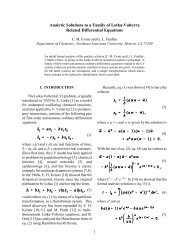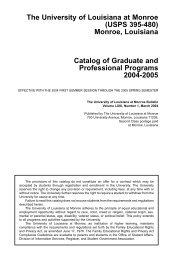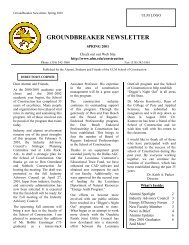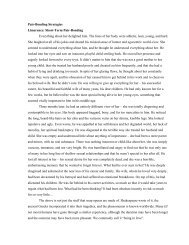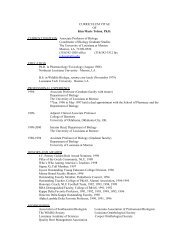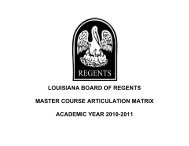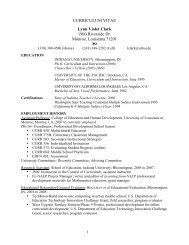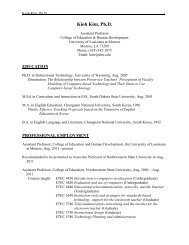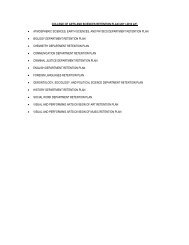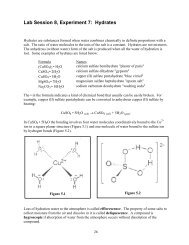Undergraduate Catalog - University of Louisiana at Monroe
Undergraduate Catalog - University of Louisiana at Monroe
Undergraduate Catalog - University of Louisiana at Monroe
You also want an ePaper? Increase the reach of your titles
YUMPU automatically turns print PDFs into web optimized ePapers that Google loves.
242 UNIVERSITY OF LOUISIANA MONROE 2012-2013 UNDERGRADUATE CATALOG<br />
4027. THEATRE LEADERSHIP AND MANAGEMENT. 3 cr. House and box<br />
<strong>of</strong>fice management, public rel<strong>at</strong>ions and program development for<br />
arts production.<br />
4031. SUMMER THEATRE PRODUCTION. 1-6 cr. Provides practical<br />
applic<strong>at</strong>ion <strong>of</strong> the<strong>at</strong>re skills in a summer the<strong>at</strong>re environment.<br />
Student’s particip<strong>at</strong>ion is determined through audition and applic<strong>at</strong>ion<br />
process. Prerequisite: permission <strong>of</strong> instructor.<br />
4043. CONTEMPORARY THEATRE PRACTICES: FRANCE. 3-6 cr.<br />
Examines current acting and directing styles and techniques in the<br />
various technical areas: scenery, lighting, sound, makeup, costumes,<br />
and properties. (Formerly THEA 442A)<br />
4044. CONTEMPORARY THEATRE PRACTICES: ENGLAND. 3-6 cr.<br />
Examines current acting and directing styles and techniques in<br />
the various technical areas: scenery, lighting, sound, makeup,<br />
costumes, and properties. (Formerly THEA 442B)<br />
TOXICOLOGY<br />
(TOXI)<br />
<strong>Undergradu<strong>at</strong>e</strong> Requirements<br />
Specific Toxicology courses are required for every<br />
student majoring in Toxicology: Toxicology 1001, 2001,<br />
3001, 4011/4013, 4012/4014, 4024, 4041, 4042/4043, and<br />
4091 (29 hours). Every Toxicology major must also take<br />
<strong>at</strong> least nine hours <strong>of</strong> electives from one <strong>of</strong> the following<br />
defined topic areas:<br />
General Toxicology: PHAR 4004, TOXI 3026, NURS<br />
2080, PHYS 2010<br />
Forensic Toxicology: CJUS 1001, 2033, 2050, 2099,<br />
3001, 3030<br />
Environmental Toxicology: BIOL 1022/1023, 2001,<br />
3003/3004<br />
Analytical Toxicology: CHEM 2040, 2041, 4007<br />
Industrial Hygiene: ATMS 4050, BIOL 2001, 4064,<br />
GEOL 4017<br />
Students pursuing admission to Pharmacy School will<br />
follow the 3-year Pre-Pharmacy curriculum listed in the<br />
undergradu<strong>at</strong>e c<strong>at</strong>alog.<br />
If a student <strong>at</strong> any time should decide against<br />
pursuing admission to Pharmacy School or fails to be<br />
admitted, the student may choose to continue to pursue<br />
a Toxicology undergradu<strong>at</strong>e degree by choosing one <strong>of</strong><br />
the aforementioned Toxicology topic areas or choose to<br />
pursue a degree other than Toxicology. Transfer students<br />
who have completed BIOL 2020, 2040 and/or 3005 <strong>of</strong> the<br />
Pre-Pharmacy curriculum may substitute one or more <strong>of</strong><br />
these courses for the 9 elective hours required in any <strong>of</strong><br />
the aforementioned Toxicology topic areas.<br />
For <strong>Undergradu<strong>at</strong>e</strong>s Only<br />
1001. TOXICOLOGY AND THE ENVIRONMENT. 3 cr. This class will<br />
provide an introduction to the field <strong>of</strong> toxicology and illustr<strong>at</strong>e<br />
the rel<strong>at</strong>ionships between chemicals, man and the environment.<br />
Historical and contemporary “case studies” <strong>of</strong> contamin<strong>at</strong>ion<br />
episodes will be used to highlight the various factors involved in<br />
evalu<strong>at</strong>ing and controlling chemical hazards. F<br />
2001. ENVIRONMENTAL TOXICOLOGY. 3 cr. This course will<br />
encompass both the f<strong>at</strong>e and effects <strong>of</strong> chemicals in the<br />
environment, with emphasis in aqu<strong>at</strong>ic and terrestrial ecosystems.<br />
Potential sources, routes <strong>of</strong> exposure, and physical, chemical, and<br />
biological factors important with the movement <strong>of</strong> contaminants<br />
within various components <strong>of</strong> the ecosystems will be examined.<br />
In addition, emerging environmental regul<strong>at</strong>ions, issues, and case<br />
studies will be discussed. Prerequisites: BIOL 1020, 1021; CHEM<br />
1007, 1009. Sp<br />
3001. INTRODUCTION TO FORENSIC TOXICOLOGY. 3 cr. An<br />
introduction to the field <strong>of</strong> Forensic Toxicology with focus<br />
on fundamentals <strong>of</strong> pharmacokinetics, specimen collection,<br />
labor<strong>at</strong>ory analysis and courtroom testimony. Additional<br />
discussion will include crime scene investig<strong>at</strong>ion, current crime<br />
lab practices and an overall applic<strong>at</strong>ion to the medicolegal<br />
pr<strong>of</strong>ession. Prerequisites: TOXI 1001, BIOL 1020, CHEM 2030,<br />
CHEM 2032. Sp<br />
3026. CLINICAL CHEMISTRY AND TOXICOLOGY. 3 cr. Principles<br />
<strong>of</strong> basic clinical chemistry and toxicology procedures applied to<br />
enzymes; endocrine function; electrolytes and blood gases; renal<br />
function; gastric, pancre<strong>at</strong>ic and intestine function; biochemistry<br />
<strong>of</strong> pregnancy; therapeutic drug monitoring and analysis <strong>of</strong> toxic<br />
substances. Prerequisite: CLSC 3022, 3023, or approval <strong>of</strong> the<br />
Program Director. (Same as CLSC 3026.) Toxicology majors only.<br />
4001. GENERAL LABORATORY TECHNIQUES. 1 cr. This class is<br />
designed to provide the student with basic skills required to work<br />
in a toxicology labor<strong>at</strong>ory. Prerequisite: Consent <strong>of</strong> instructor.<br />
Toxicology majors only.<br />
4011. GENERAL TOXICOLOGY. 3 cr. Biochemical basis <strong>of</strong><br />
chemical toxicity including toxicodynamics, biotransform<strong>at</strong>ion,<br />
toxicokinetics, mutagenicity, carcinogenicity, ter<strong>at</strong>ogenicity and<br />
toxicity testing. Prerequisites: BIOL 3011; and grade <strong>of</strong> “C” or<br />
better in TOXI 1001; and credit or registr<strong>at</strong>ion in TOXI 4013.<br />
Toxicology majors only. Sp<br />
4012. GENERAL TOXICOLOGY. 3 cr. Continu<strong>at</strong>ion <strong>of</strong> Toxicology<br />
4011. Physiological basis <strong>of</strong> chemical toxicity in organ systems.<br />
Prerequisites: TOXI 4011; and BIOL 3011, 3012; and grade <strong>of</strong><br />
“C” or better in TOXI 1001 and 2001; and credit or registr<strong>at</strong>ion in<br />
TOXI 4014. Toxicology majors only. F<br />
413-4014. GENERAL TOXICOLOGY LABORATORY. 1 cr. each.<br />
Labor<strong>at</strong>ory exercises to accompany 4011-4012. Three hours<br />
labor<strong>at</strong>ory. Prerequisite: Credit or registr<strong>at</strong>ion in TOXI 4011 and<br />
4012. Toxicology majors only.<br />
4015. ANALYTICAL TOXICOLOGY. 1 cr. Quantit<strong>at</strong>ive and qualit<strong>at</strong>ive<br />
methods <strong>of</strong> chemical analysis <strong>of</strong> toxic substances. Prerequisites:<br />
TOXI 4012; and CHEM 3007 and 3008; and credit or registr<strong>at</strong>ion<br />
in TOXI 4016. Toxicology majors only.<br />
4016. ANALYTICAL TOXICOLOGY LABORATORY. 2 cr. Labor<strong>at</strong>ory<br />
exercises to accompany 4015. Six hours labor<strong>at</strong>ory. Prerequisite:<br />
credit or registr<strong>at</strong>ion in TOXI 4015. Toxicology majors only.<br />
4024. CLINICAL TOXICOLOGY. 2 cr. Inform<strong>at</strong>ion on the clinical<br />
management <strong>of</strong> poisonings including the assessment <strong>of</strong> toxic<br />
potential, stabiliz<strong>at</strong>ion <strong>of</strong> vital function, and specific antidotal<br />
measures. Prerequisite: Credit or registr<strong>at</strong>ion in TOXI 4012 and<br />
4014. F (Same as PHARM 5024).<br />
4041. INDUSTRIAL HYGIENE I. 3 cr. Introduction into industrial<br />
hygiene covering its history, ethics, and general principles.<br />
Review <strong>of</strong> regul<strong>at</strong>ory agencies and occup<strong>at</strong>ional safety and<br />
health standards included. Detailed discussions regarding<br />
specific occup<strong>at</strong>ional hazards will begin, and include properties<br />
<strong>of</strong> the hazard, industrial exposure potential, exposure monitoring<br />
techniques, relevant regul<strong>at</strong>ory standards, and control<br />
methodologies. Prerequisites: TOXI 1001 and 2001. Sp



